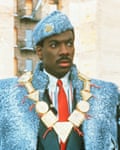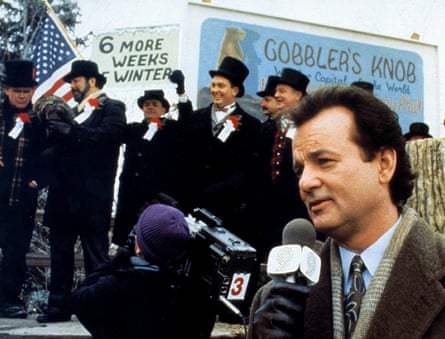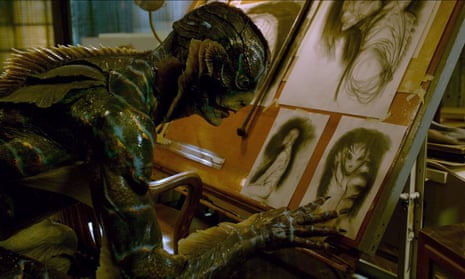If Dorothy Parker is to be believed, the only “ism” that Hollywood holds dear is plagiarism. And, these days, that seems truer than ever. Every day brings another lawsuit from an aggrieved screenwriter. Many are without merit; some prove naggingly robust. This month has seen two high-profile cases. Screenwriter Gary L Goldman has filed a second suit against Disney, claiming the studio purloined his artwork, dialogue, characters and other elements for its animated comedy Zootopia, released in the UK as Zootropolis. (Disney has described the allegations as “patently false”.) And the makers of Kingsman: The Secret Service are being sued by R Spencer Balentine for lifting elements from his unproduced screenplay The Keepers to augment their adaptation of Mark Millar and Dave Gibbons’s graphic novel. (Fox has yet to respond to the suit.) But it is Guillermo del Toro’s romantic fantasy The Shape of Water, nominated for 13 Oscars, that is currently the biggest magnet for plagiarism claims.

Few films have had to weather accusations from so many different directions. First there were students from the Netherlands Film Academy insisting that the premise was lifted from their short film The Space Between Us, about a female cleaner who comes to the rescue of an amphibious humanoid in a laboratory. That objection was dealt with swiftly: plans for Del Toro’s movie were under way by 2015, when that short was made, and the NFA declared that no theft occurred. But representatives of the late playwright Paul Zindel have since filed a copyright infringement lawsuit, accusing The Shape of Water of reproducing elements from the play Let Me Hear You Whisper, in which the creature concerned is a dolphin. (Fox Searchlight said in a statement: “Guillermo del Toro has never read nor seen Mr Zindel’s play in any form.”) Meanwhile director Jean-Pierre Jeunet has pointed out similarities between the edge-of-the-sofa soft-shoe shuffle in The Shape of Water and a scene in his film Delicatessen, in which a man and a woman use squeaking bedsprings to create a musical rhythm.
Jonathan Bailey, editor of the website Plagiarism Today, says the wording of the law regarding plagiarism is fairly woolly. “In the US, it’s down to whether an ordinary observer, not an expert in film-making, would recognise that A is based on B. That’s a very loose standard,” he says. But he believes the proliferation of claims against The Shape of Water may work in its favour. “It’s become a back-burner issue, and part of that is because of the conflicting and competing allegations. The first one was debunked so easily that there’s a sense that the issue has already been dealt with. In a weird way, the first case may have weakened the subsequent ones, with news fatigue setting in.”

Del Toro might be comforted by the fact that claims multiply during awards season, when the promise of prestige and money fills the air. The makers of The Hurt Locker were sued unsuccessfully by US army sergeant Jeffrey Sarver, who claimed he was the inspiration for the main character. Hans Zimmer was sued, also without success, over the score for 12 Years a Slave. And Kim Novak took issue with The Artist over its use of music from her most noted film, Vertigo. “I want to report a rape,” she announced in a full-page ad in Variety, exhibiting that sense of proportion for which actors the world over are renowned.
“Every single film that is a success has ‘You stole it off me’ suits coming out of its ears,” says screenwriter John Wrathall, who wrote the Viggo Mortensen drama Good and the Jack O’Connell/Tim Roth thriller The Liability. “If you can prove it with a memo that says, ‘You might want to borrow from this script’ or something like that, then you have a case. Otherwise it’s just sour grapes. Novice screenwriters are the only ones who worry about plagiarism – except lawyers, I suppose. But different people having the same idea isn’t so rare.” Wrathall himself considered taking action over similarities between his 1997 short film Magic Moments, about a woman at a Snappy Snaps-style shop who collects photographs of a customer with whom she is obsessed, and the 2003 thriller One Hour Photo, featuring Robin Williams as an identically inclined stalker. “I followed it up at the time and spoke to a lawyer but, without proof, it was a bit of a nonstarter. Now I don’t see it as a problem, and it was only an attempt at self-promotion then,” he admits.

There can’t be an infinite amount of plots, after all, which explains why the same basic story has been shared among a number of films – look at The Searchers, Taxi Driver, Star Wars, Paris, Texas and Mona Lisa to see variations on the same idea – without this qualifying as plagiarism. Part of the problem, Bailey says, is that charges can be hard to prove. “There’s no Turnitin for movies,” he explains, referring to the online plagiarism detection service. Occasionally there will be a clear-cut case, such as Shia LaBeouf’s 2012 short film HowardCantour.com, which was lifted directly from the 2007 comic Justin M Damiano by Daniel Clowes. (LaBeouf apologised, claiming to have “got lost in the creative process”.) “It’s unusual to have that level of clarity,” Bailey says. “Film-making as an art form is fairly new compared with writing or music, and we’re still developing our understanding of the language of cinema, the core elements. Every trope was someone’s original idea at some point. And when a movie is successful, people who came up with something similar but not identical see more of their work in that thing than there actually is; 99% of these go absolutely nowhere. Only a handful have any momentum.”
The most salutary lesson for any Hollywood studio hoping to disprove plagiarism charges in court revolves around Coming to America, the Eddie Murphy comedy about an African prince who decamps to New York. Art Buchwald and his producing partner Alain Bernheim filed a $5m lawsuit in 1988, arguing that the picture was based on a treatment written by Buchwald and sold to Paramount five years earlier. They were awarded $900,000 in 1992, reduced to $825,000 after a further seven-year legal battle.

Some studios have fought accusations and won. The producers of Die Hard were sued by the actor-writer-director Alexis Kanner, who stated in a 352-page suit that the movie represented the “wholesale cinematic Xeroxing” and “cinematic rape” of his 1981 thriller Kings and Desperate Men. He lost, and rightly so: the films, both brilliant in their own way, have nothing in common but hostages and explosives. Groundhog Day came under attack from Leon Arden, who believed the film had ripped off his novel One Fine Day about a time loop that returns one man repeatedly to 15 April, the deadline for US tax returns. The judge disagreed, calling Groundhog Day “a creative, entertaining work that is substantially different from [Arden’s] expression of his idea” and arguably paving the way for that film in turn to be rehashed as Source Code, 50 First Dates, Edge of Tomorrow and Happy Death Day.
Most cases, however, are settled quietly out of court to avoid adverse publicity and stratospheric legal fees. This was true of The Terminator, which owed a creative debt to an Outer Limits episode written by Harlan Ellison, who was added to the film’s credits, and Look Who’s Talking, which was accused of being too close to another baby-oriented script, Special Delivery.
But it isn’t only in the studio’s best interest to settle. Donna Douglas and Curt Wilson sued Disney, claiming that the Whoopi Goldberg comedy Sister Act was ripped off from their script, A Nun in the Closet. Disney offered a $1m settlement, which the writers rejected in favour of going to trial. The case was later thrown out. Compensation came there nun.
Litigation is now part of the landscape in Hollywood. “Go ahead and send your script to Universal, Paramount, all those guys,” says Bailey. “They’ll just ship it back to you unopened. They can’t risk you saying they stole your work.” Even that belt-and-braces approach doesn’t preclude legal action. The nadir of movie litigation arguably occurred when a visual design artist succeeded in delaying the US release of Terry Gilliam’s 12 Monkeys after noticing that a chair similar to one he had designed had been used in a scene without credit. On the whole, though, sanity prevails. “Most claims are genuine but mistaken,” Bailey says.
For his part, Wrathall has learned to take a sanguine approach. “My attitude is like that line in The Red Shoes: ‘It is much more disheartening to have to steal than to be stolen from.’”







